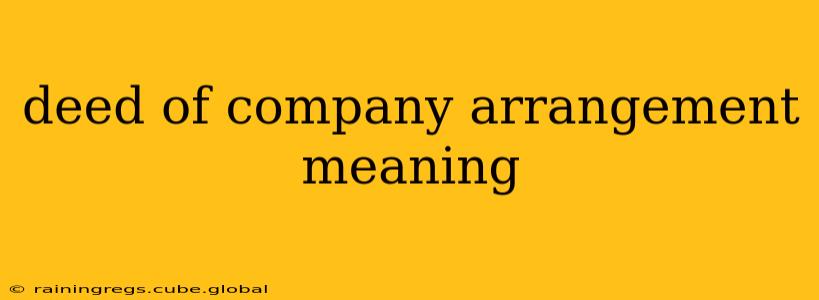A Deed of Company Arrangement (DOCA) is a legally binding contract that allows a financially distressed company to restructure its debts and operations to avoid liquidation. It's a crucial tool in Australian insolvency law, offering a lifeline to businesses facing significant financial challenges. This comprehensive guide will delve into the meaning and intricacies of a DOCA, answering frequently asked questions and providing crucial insights for businesses and stakeholders alike.
What is a Deed of Company Arrangement?
In simple terms, a DOCA is a formal agreement between a financially troubled company and its creditors. It outlines a plan for the company to repay its debts over a period of time, often involving a restructuring of its operations, asset sales, or a combination of both. The aim is to allow the company to continue trading and eventually emerge from its financial difficulties, paying back its creditors according to the terms agreed upon in the DOCA. It represents a compromise between complete liquidation and continued business as usual, offering a viable alternative for both the company and its creditors.
Who is involved in a Deed of Company Arrangement?
Several key parties participate in the DOCA process:
- The Company: The indebted business seeking to restructure its debts.
- Creditors: Individuals or entities owed money by the company.
- Administrator: An independent professional appointed by the court to oversee the DOCA process, ensuring its fairness and compliance with the law. They act as a neutral party to protect the interests of all parties involved.
- The Court: The court approves the DOCA, ensuring it adheres to legal requirements and is in the best interests of all creditors.
How does a Deed of Company Arrangement work?
The process generally involves these key steps:
- Application for Administration: The company (or a creditor) applies to the court for administration.
- Appointment of Administrator: The court appoints an administrator to manage the company's affairs.
- Development of the DOCA: The administrator works with the company and its creditors to develop a proposed DOCA, outlining the terms of debt repayment and restructuring.
- Creditor Meeting: The administrator convenes a meeting of creditors to vote on the proposed DOCA. Approval requires a majority in number and value of creditors.
- Court Approval: Once approved by creditors, the DOCA needs court approval to become legally binding.
- Implementation of the DOCA: Once approved, the company implements the DOCA, adhering to the terms outlined in the agreement.
What are the advantages of a Deed of Company Arrangement?
- Avoids Liquidation: A DOCA allows a company to avoid the potentially devastating consequences of liquidation, preserving jobs and assets.
- Restructures Debt: It allows for a more manageable repayment schedule, giving the company time to improve its financial position.
- Preserves Business Operations: The company can continue trading and potentially become profitable again.
- Compromise Solution: It offers a compromise that benefits both the company and its creditors, compared to the potential losses of liquidation.
What are the disadvantages of a Deed of Company Arrangement?
- Complex and Time-Consuming: The process can be lengthy and complex, requiring significant time and resources.
- Requires Creditor Cooperation: Success depends on the cooperation of creditors, which isn't always guaranteed.
- Potential Loss for Creditors: Creditors may receive less than the full amount they are owed.
- Reputational Damage: Entering administration and undertaking a DOCA can negatively impact a company's reputation.
What are the common terms used in a Deed of Company Arrangement?
Understanding the terminology is crucial:
- Administrator: The independent professional overseeing the process.
- Creditor: An individual or entity owed money by the company.
- Liquidation: The formal process of winding up a company's affairs and selling its assets to repay creditors.
- Restructuring: The process of reorganizing a company's operations and finances.
- Voting Threshold: The required percentage of creditors needed to approve a DOCA.
How long does a Deed of Company Arrangement last?
The length of a DOCA varies depending on the specific circumstances of the company and the terms agreed upon. It can range from a few months to several years.
Can a Deed of Company Arrangement fail?
Yes, a DOCA can fail if the company fails to meet the terms of the agreement, or if creditors lose confidence in the company's ability to recover. In such cases, the company may end up in liquidation.
This information is for general guidance only and does not constitute legal advice. If your company is facing financial difficulties, it's crucial to seek professional advice from an insolvency practitioner or lawyer experienced in DOCAs. They can help you navigate the complexities of the process and determine the best course of action for your specific circumstances.
